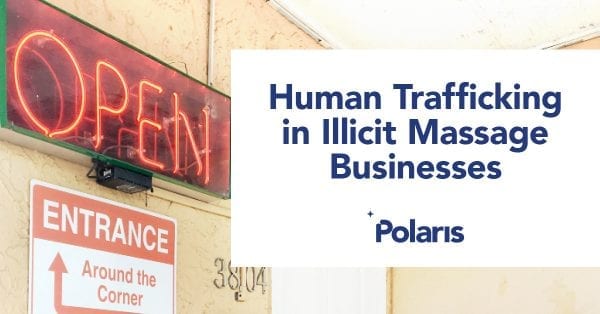
Illicit Massage Businesses: A Guest Blog by Polaris
This week’s blog is guest authored by Polaris.
With names like “Good Girl Spa,” and signs advertising “hot Asian women,” many businesses that claim to offer massage and bodywork in fact make little effort to hide what they really sell – commercial sex. They get away with it in part because these businesses have operated with such impunity and for so long that most Americans sort of shrug them off, assuming that what goes on behind their doors is essentially victimless crime. That is wrong. A new report from Polaris finds that human trafficking is rampant in illicit massage businesses. Polaris documented over 9,000 such businesses operating in America today, in every single state. Together they comprise a $2.5 billion-a-year criminal industry.
The new report details how this trafficking system works and offers actionable solutions for ending it, such as stronger civil regulations of businesses that claim to provide massage. The scope of human trafficking in massage businesses is such that Polaris believes implementing these regulations should be a priority for the anti-human trafficking movement.
Data from the National Human Trafficking Hotline, which Polaris operates, found that calls about trafficking in massage parlors were second in prevalence only to those about trafficking in escort services. Even so, as in all human trafficking situations, the situations we know about are likely only a small sliver of the problem.
To determine the extent of trafficking in massage parlors, Polaris researchers spoke with a range of survivors, service providers, and law enforcement officials and delved into case studies from around the country. They found that the vast majority of women providing commercial sex in these venues had been recruited through fraudulent advertisements, and coerced and manipulated into staying in expoitative situations. The women fit a very distinct profile. They are immigrants from China or South Korea who came to the United States because of dire financial need. Most are in their mid-30s to late-50s and have children.
The means of control in massage parlor trafficking follows a careful script. Women are told that that police in the United States are corrupt and there is no way for them to get help. They are told they will be deported if they seek employment elsewhere, and that their families will be shamed. They are paid less than minimum wage or no wage at all, and are on call seven days a week or otherwise in situations that violate American labor law. They are told this is normal, this is just how things are in the United States.
While law enforcement certainly plays an important role in shutting down illicit massage parlor businesses, going after individual venues, one by one, is both resource-intensive and ultimately ineffective. These are organized networks and thus organized crime investigations make more sense. These investigations, of course, also cost a great deal of time and money.
Jurisdictions around the country are starting to recognize that there are better ways to shut down massage parlor trafficking and provide women in these situations better options, by making the business less lucrative for traffickers. This is done through passage of commonsense civil laws that require massage businesses to adhere to certain health and safety standards — much like other businesses, including restaurants and beauty salons, already do. For example, simply requiring that all patrons enter the establishment through an easily visible front door — as opposed to through a more hidden entrance which is the norm for these businesses — is likely to dissuade a substantial percentage of potential sex buyers who are worried about being caught. Exactly what the law looks like will differ depending on the jurisdiction, but the important thing is that laws are consistent — so traffickers can’t just pick up and move to a nearby, “friendlier” location. Polaris is working with forward-thinking legislators around the country to move these kinds of bills forward at the state, city, and county level, and enlisting the public’s help in convincing other legislators that this matters and that it’s time to get to work. We are excited about the possibility of using the democratic process to disrupt massage parlor trafficking at the scale of the crime. We hope you will join us.
Polaris is a leader in the global fight to eradicate modern slavery. Named after the North Star that guided slaves to freedom in the U.S., Polaris systemically disrupts the human trafficking networks that rob human beings of their lives and their freedom. Their comprehensive model puts victims at the center of they do – helping survivors restore their freedom, preventing more victims, and leveraging data and technology to pursue traffickers wherever they operate.
Photo courtesy of Polaris.
